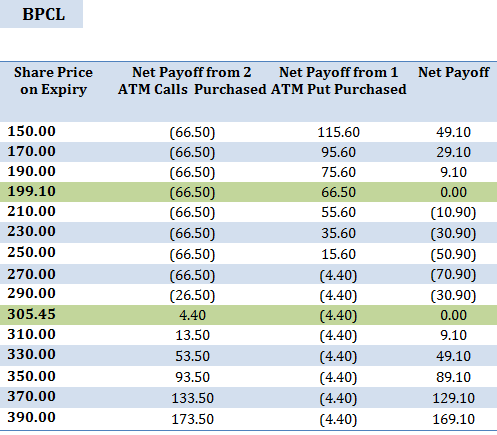When to use: Strap option strategy is used when the investor is bullish on the stock and expects volatility in the near future.
How it works: Strap option strategy uses three option contracts of the same underlying stock, with the same expiry date and same strike prices. In this strategy, you buy 2 at-the-money call options and 1 at-the-money put option, each with the same expiry date, T.
For example: On 29th August 2013, when the share of BPCL was trading at Rs. 270.00, you decided to buy 2 at-the-money call options at a premium of Rs. 33.25 expiring 26th September 2013; and you bought 1 at-the-money put option at a premium of Rs. 4.40, with a Strike Price of Rs. 270.00, expiring 26th September 2013.
Risk/Reward: In strap option strategy, the risk is limited to the net premium paid for the position and the maximum reward/profit is unlimited. In this strategy you can make huge profits if the underlying stock makes a strong move on either upside or downside upon expiry (however, larger gain will be made with an upward movement).
For 2 ATM Call Options – If the price of BPCL rises above Rs. 270.00 (i.e. the strike prices of the long call options), you can exercise your options, but the price of the stock must rise above Rs. 303.25 (i.e. strike price of the long call options + the amount of premium you paid for each option) for you to exercise your option and make a profit.
For 1 ATM Put Option – If the price of the share falls below Rs. 270.00 (i.e. the strike price of the long put option), you can exercise your option, but the price of the stock must fall below Rs. 265.60 (i.e. the strike price of the long put option minus the premium), for you to exercise your option and make a profit.
The table below shows the net payoff of the strap option strategy assuming different spot prices on the expiry date:
The table above allows you to easily see the break-even points, maximum profit and the loss potential at expiry in rupee terms. The calculations are presented below.
The two break-even points occur when the price of the underlying share equals Rs. 199.10 and Rs. 305.45.
First Break-even Point = Strike price – net premium paid = Rs. 199.10 (270.00 – 70.90)
Second Break-even Point = Strike price + (net premium paid/2) = Rs. 305.45 (270 + (70.90/2))
The profit potential is unlimited but higher gain will be made if the share price moves upward.
The maximum loss which the investor may suffer is equal to the net premium paid i.e. Rs. 70.90. Maximum loss, in this example, will be incurred if the share price remains equal to the strike price (i.e. Rs. 270.00).
How to use the Strap Option Strategy Excel calculator
Just enter your expected spot price on expiry, option strike price and the amount of premium, to estimate your net pay-off from the Strap Option Strategy.
Note: The example and calculations are based assuming a single share though in reality options are based on lots of many shares. For example BPCL’s option contract is for 1,000 shares. Accordingly the net premium paid will be Rs. 70,900 for 3 lots (i.e. 70.90*1000) in our example.



There is some calculation mistake, the call and put premiums are generally the same for same strike price and same expiry. pl confirm.
No, in fact they will generally not be the same.